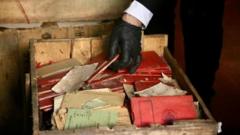Recent discovery of Nazi documents in Argentina highlights the country's complex relationship with WWII and its aftermath.
Rediscovered Nazi Documents in Argentina's Supreme Court Raise Historical Questions

Rediscovered Nazi Documents in Argentina's Supreme Court Raise Historical Questions
Unexpected findings of Nazi artifacts in Argentina's highest court basement could unveil crucial historical ties.
In a remarkable unveiling, crates filled with Nazi-era documents were uncovered by workers in the basement of Argentina’s Supreme Court during preparations to relocate archives to a new museum. This extraordinary find includes membership booklets and propaganda materials that are believed to have been sent from the German embassy in Tokyo on June 20, 1941. The shipment, contained within 83 diplomatic pouches aboard the Japanese vessel Nan-a-Maru, arrived in Argentina during a period of heightened global tension.
Argentine customs officials flagged the shipment amidst concerns it could jeopardize the nation’s neutrality in World War II. After a random inspection revealed Nazi propaganda materials in five of the pouches, they were subsequently seized. The Supreme Court has confirmed that the wooden crates, rediscovered last week, contained various materials aimed at promoting Adolf Hitler's ideology in Argentina during the war.
Upon their discovery, the crates were promptly secured, and the court notified the Buenos Aires Holocaust Museum, seeking assistance to catalog the contents. Reports indicate that historians are optimistic the documents could shed light on the Nazis' financial networks and their international connections.
The Argentine Supreme Court detailed that the suspicious shipment was labeled as "personal effects" by the German Embassy, yet its substantial size raised alarms among customs officials, leading to an intervention at the time. Initially seeking the return of the packets, the German embassy was thwarted when an Argentine judge ordered the seizure of all pouches in September 1941. However, little action was taken on the matter until 1944, when Argentina severed ties with the Axis powers, allowing the crates to lie dormant in the court's basement for decades.
Following World War II, Argentina, under Juan Perón's leadership, became a haven for numerous high-ranking Nazi figures such as Adolf Eichmann and Josef Mengele, prompting a long-standing dialogue about the nation’s role in harboring war criminals. In the year 2000, President Fernando de la Rúa offered an official apology for Argentina's actions during this period, addressing the controversial legacy that has continued to impact the country’s historical narrative.




















